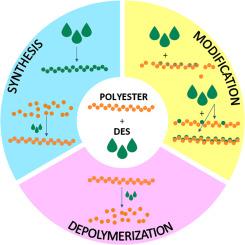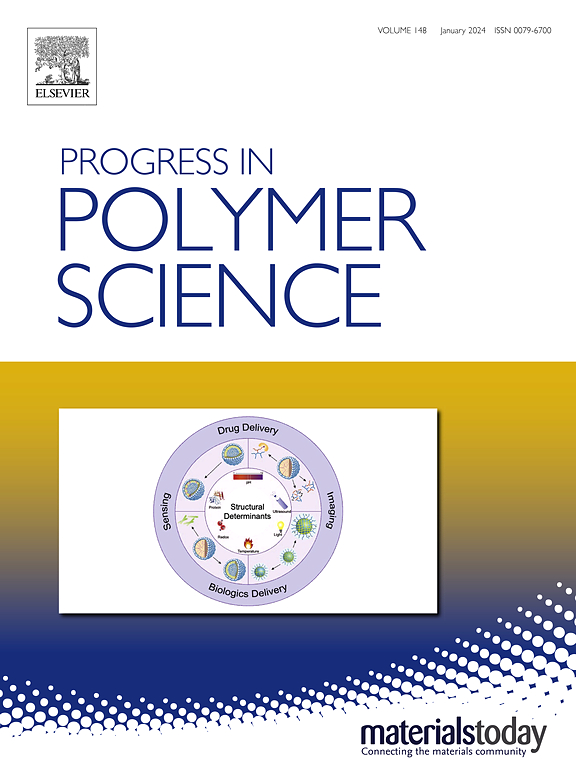Polyesters and deep eutectic solvents: From synthesis through modification to depolymerization
IF 26.1
1区 化学
Q1 POLYMER SCIENCE
引用次数: 0
Abstract
Thermoplastic polyesters constitute an important class of materials in today's world due to their unique combination of properties, versatility, recyclability, sustainability, and other advantages. A wide range of monomers used in polyesters synthesis lead to their usage in various industries, such as packaging, automotive, or electronics. Poly(ethylene terephthalate) (PET) and other thermoplastic polyesters have been around for decades, however, nowadays, with growing problems such as microplastic migration, growth of landfills, and decreasing sources of fossil fuels, the lack of their biodegradability or the high cost of biodegradable ones make it necessary to search for greener solutions. A novel group of media: deep eutectic solvents (DESs) that have found applications in many areas of science, can also be applied in polyester technology. This review is a holistic approach presenting polyesters in every step of their technology. DESs as easy-to-prepare, green, and cheap alternatives to the organic solvents, metal salts, and ionic liquids employed as reaction media or catalysts. In polyester synthesis, DESs serve as monomer sources, reaction media, and catalysts, i.e. monomeric DESs facilitate solvent-free, autocatalyzed polymerization and production of safe and biodegradable materials that can be applied, for example, in pharmaceutical or medicine engineering. Some DESs cannot depolymerize polyesters, but can render their surfaces more hydrophilic without affecting crystallinity and thus hold promise as functional additives (interfacial/active agents, plasticizers and compatibilizers) for polyesters and their blends. DESs have been widely used in the depolymerization of polyesters (mainly PET but also poly(lactic acid) and poly(ethylene 2,5-furanoate)) as cheaper or greener catalysts or reaction media (or both) with conversion up to 100% and high yield of monomer. In this paper, we consider polyesters and DES issue from the “cradle-to-grave” or even "cradle-to-grave-to-cradle" viewpoint emphasizing the importance of solvolysis as a chemical recycling method. Finally, we present the future perspectives and possibilities of DES usage in polyester technology.


聚酯和深共晶溶剂:从合成到改性到解聚
热塑性聚酯由于其独特的综合性能、多功能性、可回收性、可持续性和其他优点,在当今世界上构成了一类重要的材料。聚酯合成中使用的各种单体导致它们在各种工业中使用,如包装,汽车或电子。聚对苯二甲酸乙酯(PET)和其他热塑性聚酯已经存在了几十年,然而,如今,随着微塑料迁移、垃圾填埋场的增长和化石燃料来源的减少等问题的日益严重,它们缺乏可生物降解性或可生物降解的高成本使得有必要寻找更环保的解决方案。一组新的介质:深共晶溶剂(DESs)已经在许多科学领域得到了应用,也可以应用于聚酯技术。这篇综述是一个全面的方法,介绍聚酯在其技术的每一步。作为反应介质或催化剂的有机溶剂、金属盐和离子液体的替代品,DESs易于制备、绿色环保且价格低廉。在聚酯合成中,DESs作为单体来源、反应介质和催化剂,即单体DESs促进无溶剂、自催化聚合和生产安全、可生物降解的材料,这些材料可以应用于制药或医药工程等领域。一些聚醚不能解聚聚酯,但可以使其表面更亲水而不影响结晶度,因此有望作为聚酯及其共混物的功能添加剂(界面/活性剂、增塑剂和相容剂)。DESs在聚酯(主要是PET,但也包括聚乳酸和聚乙烯2,5-呋喃酸酯)的解聚中作为更便宜或更环保的催化剂或反应介质(或两者兼有),转化率可达100%,单体收率高。在本文中,我们从“从摇篮到坟墓”甚至“从摇篮到坟墓到摇篮”的观点来考虑聚酯和DES问题,强调溶剂分解作为一种化学回收方法的重要性。最后,我们提出了DES在聚酯技术中应用的前景和可能性。
本文章由计算机程序翻译,如有差异,请以英文原文为准。
求助全文
约1分钟内获得全文
求助全文
来源期刊

Progress in Polymer Science
化学-高分子科学
CiteScore
48.70
自引率
1.10%
发文量
54
审稿时长
38 days
期刊介绍:
Progress in Polymer Science is a journal that publishes state-of-the-art overview articles in the field of polymer science and engineering. These articles are written by internationally recognized authorities in the discipline, making it a valuable resource for staying up-to-date with the latest developments in this rapidly growing field.
The journal serves as a link between original articles, innovations published in patents, and the most current knowledge of technology. It covers a wide range of topics within the traditional fields of polymer science, including chemistry, physics, and engineering involving polymers. Additionally, it explores interdisciplinary developing fields such as functional and specialty polymers, biomaterials, polymers in drug delivery, polymers in electronic applications, composites, conducting polymers, liquid crystalline materials, and the interphases between polymers and ceramics. The journal also highlights new fabrication techniques that are making significant contributions to the field.
The subject areas covered by Progress in Polymer Science include biomaterials, materials chemistry, organic chemistry, polymers and plastics, surfaces, coatings and films, and nanotechnology. The journal is indexed and abstracted in various databases, including Materials Science Citation Index, Chemical Abstracts, Engineering Index, Current Contents, FIZ Karlsruhe, Scopus, and INSPEC.
 求助内容:
求助内容: 应助结果提醒方式:
应助结果提醒方式:


